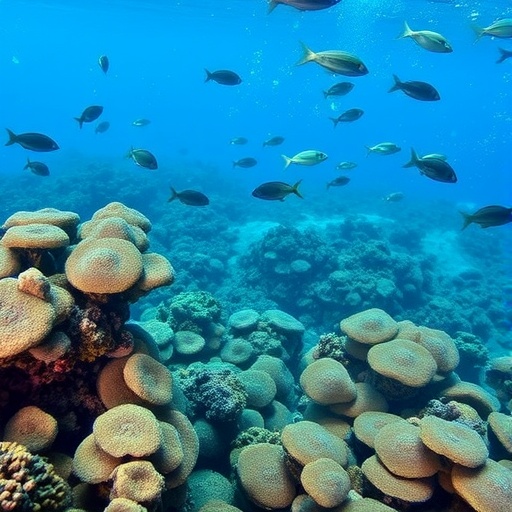In a groundbreaking study published in Coral Reefs, researchers have unveiled pivotal insights into the diverse dynamics of coral reef ecosystems under stress. The work, conducted by N.P. Jones, S.E. Leinbach, and D.S. Gilliam, emphasizes the pronounced interspecific variation in demographics that characterizes these highly disturbed marine environments. As climate change continues to escalate and anthropogenic pressures mount, understanding which species thrive and which struggle becomes more crucial than ever for conservationists and marine ecologists alike.
The research focuses on coral reefs, which are known as the “rainforests of the sea,” highlighting their rich biodiversity and critical ecological roles. Despite their importance, these ecosystems face unprecedented threats, including ocean warming, acidification, and pollution. The authors have meticulously analyzed demographic parameters across several coral species to explore how these stressors affect growth, reproduction, and survival in a fragmented habitat, ultimately revealing the ecological winners and losers in this turmoil.
Through rigorous field studies and sampling in various reef locations, the researchers collected demographic data from numerous coral species. This extensive dataset allowed them to identify patterns in population dynamics specific to each species. Disturbances, whether natural or human-induced, do not affect all corals equally; rather, certain species demonstrate resilience, while others show vulnerability in response to environmental changes. This variation is critical for understanding how coral reefs might adjust to rapidly changing conditions in the future.
One of the most significant findings from this study is the disparity in survival and growth rates among coral species under stress. For instance, some species, often termed “winner” species, exhibit rapid growth and reproductive success even in adverse conditions, while “loser” species struggle to maintain their populations. This dichotomy sheds light on the potential for species-specific management strategies, allowing conservationists to prioritize interventions for the most vulnerable species.
Moreover, this research emphasizes the role of genetic diversity within coral populations. Genetic variation can enhance resilience against environmental stressors, allowing some individuals to withstand rising temperatures and more acidic ocean waters. This resilience is vital in maintaining the overall health of coral reefs as they face escalating threats. By promoting genetic diversity through reserves and breeding programs, we may improve the chances for long-term survival of various species.
The study’s authors employ sophisticated statistical models to quantify the interspecific variations in demographics, highlighting the importance of a multi-faceted approach to ecological research. By integrating various ecological and environmental parameters into their analysis, they provide a comprehensive view of how demographic variations affect community structure and ecosystem function. This level of detail is especially relevant for informing policy decisions and establishing effective conservation practices.
In addition to examining demographic patterns, Jones and colleagues also delve into the interactions between corals and their associated fauna. The symbiotic relationships between corals and their diverse inhabitants, including fish, mollusks, and other invertebrates, play a vital role in the health of reef ecosystems. Disruptions to coral populations can subsequently impact these relationships, leading to cascading effects throughout the ecosystem. It’s imperative to consider these interactions when assessing the ecological impacts of disturbances.
A significant aspect of this research is its timing and relevance, conducted against the backdrop of ongoing climate change discussions. The urgency of the findings cannot be overstated, as policymakers grapple with immediate actions to combat reef destruction. As corals are not just integral to marine biodiversity but also crucial to local economies through tourism and fisheries, understanding which species can endure and thrive becomes a pressing challenge for communities worldwide.
The implications of these findings extend beyond academic interest, emphasizing the concept of ecological resilience in the face of impending climate change. Conservation strategies that bolster the resilience of “winner” species while protecting “loser” species will be paramount for the future of coral ecosystems. This nuanced understanding is essential for informed management practices that can ensure the sustainability of coral reefs amid changing environmental conditions.
Within the broader picture of marine conservation, this research refuses to treat coral reef systems monolithically. The variations within species responses underline the importance of tailored strategies that can address the unique challenges facing different coral types. It paves the way for more targeted conservation initiatives that are informed by scientific evidence rather than a one-size-fits-all approach.
A critical takeaway from this study is the imperative need for ongoing monitoring and research to adapt to changing reef dynamics. As ecosystems continue to evolve in response to climate change, continued investigation into the demographics of different coral species will provide timely insights into their needs and vulnerabilities. Long-term studies can capture the complexities of these environments, creating a robust framework for future research.
The authors’ findings also serve as a call to action for enhanced collaboration between scientists, policymakers, and stakeholders. Integrating scientific findings into conservation policies is key to ensuring that management strategies are effective. By fostering a dialogue between researchers and those involved in coral reef conservation, stakeholders can devise innovative solutions that leverage the strengths of different species and enhance reef resilience.
In conclusion, the work of Jones, Leinbach, and Gilliam provides invaluable insights into the demographic intricacies of coral reefs amidst increasing disturbances. Their study not only identifies the winners and losers within these aquatic ecosystems but also underlines the critical routes to enhancing conservation efforts. As we look to the future, it is clear that a nuanced understanding of coral demographics will play a vital role in preserving these extraordinary ecosystems for generations to come.
Subject of Research: Coral reef demographics under environmental stress
Article Title: Interspecific variation in demographics reveals ecological winners and losers in a highly disturbed coral reef system
Article References: Jones, N.P., Leinbach, S.E. & Gilliam, D.S. Interspecific variation in demographics reveals ecological winners and losers in a highly disturbed coral reef system. Coral Reefs (2025). https://doi.org/10.1007/s00338-025-02681-2
Image Credits: AI Generated
DOI: 10.1007/s00338-025-02681-2
Keywords: Coral reefs, Ecological resilience, Demographic variation, Climate change, Conservation strategies, Species interactions.




